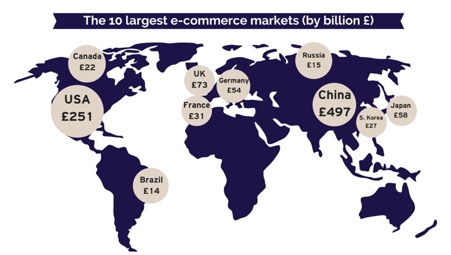Evidence shows that small and medium-sized businesses that export are more likely to achieve higher turnover growth, in addition to being more stable and sustainable if the local market does take a downturn due to companies spreading their risk. We spoke to Charlie Ruigrok, Department for International Trade’s Digital Trade Adviser to find out more.
So how can you access new markets in a cost-effective way. International trade used to be the realm of large international corporations with well-resourced teams due to the effort it took to set up local offices to meet the demand of the market as with exposure to international competition can bring challenges and risks.
However, with the adoption and global use of the internet and technology has disrupted these traditional operating models. As a result, this enables small and medium size businesses to potentially access the 3.5 global internet users via their desk or even their phone using a website or third party sales channel. There are obviously challenges to this but means that existing barriers such as communication and time to respond are no longer there. So as Market-entry strategies becomes an easy-to-enable solution due to the ability for exporters to shorten the value chain & access markets previously too expensive/complicated to enter.
Global B2C Ecommerce is set to be $2.3 trillion by the end of 2018 and international ecommerce has become second nature to users in Europe with 30% of online shoppers there purchasing cross border way back in 2015. The ecommerce landscape in the UK has reached a level of maturity not only making it a serious consideration but also a business model that is no longer a dark art with very defined practices for success. Read TFG’s Guide: E-Commerce tips for importers and exporters here.
Based on statistics of average online spend per person the UK is one of the global leaders in ecommerce and something we are exceptionally good at. This has driven to high competition in this space but also means that companies in the UK digital strategy tends to be more advanced than other markets. So, if you are already a successful ecommerce business in the UK market then with a slight change to your strategy not only could you be more competitive than local companies and as a result see fantastic growth. If you look at tools like Google global market finder or Facebook’s cross border insights you can see that even though there are larger search and user volumes the comparative advertising price or CPC outside of the UK is generally much lower.
If you are not already a successful ecommerce company and sell direct to consumers then it may be worth reviewing your strategy to understand why. If the local market is too competitive online then potentially there is not only more demand for your products overseas, less competition and established sales channels already set up. Although Amazon only has 15 local platforms it is available in 169 countries to purchase from or with eBay having 23 international sites accessing over 100 countries you can leverage these services from the UK relatively easily. If you do not want to use these platforms there are plenty of options for online selling overseas as the Department for international trade has identified over 400 online sales channels or marketplaces outside of potentially internationalising your own website.
Charlie Ruigrok, Department for International Trade, Digital Trade Adviser
Charlie works for the Department for international trade advising businesses of all shapes and sizes on breaking through traditional barriers to exporting overseas, using exciting digital channels. Charlie supports firms on digital marketing, search engine optimisation, social media, e-commerce best practice, mobile marketing, localisation, website analytics and data analysis. Read our article on China and B2B E-commerce here.
With a wealth of experience in the field, having previously worked with a range of private organisations on e-commerce and digital projects – leading on platform management, website building and optimisation for several international brands across Europe
Twitter: https://twitter.com/Charlie_DIT
 Australia
Australia Hong Kong
Hong Kong Japan
Japan Singapore
Singapore United Arab Emirates
United Arab Emirates United States
United States France
France Germany
Germany Ireland
Ireland Netherlands
Netherlands United Kingdom
United Kingdom







Comments are closed.